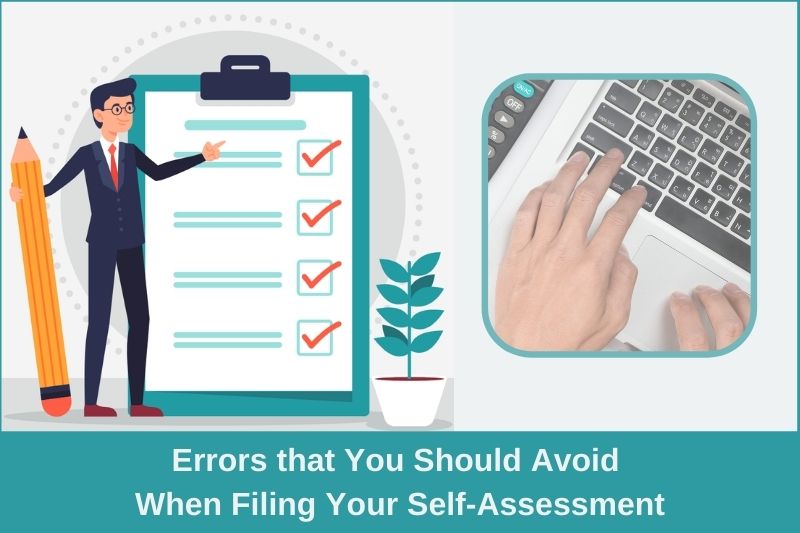Errors that You Should Avoid When Filing Your Self-Assessment!

December 21, 2020
Just submitting your self-assessment on time is not that important. You need to ensure that it is error-free of any unintentional mistakes. While there are penalties for not meeting the deadline when it comes to filing your self-assessment, another lesser-known penalty is one chargeable for not being too meticulous when filing the return in the first place. It doesn’t pay to be careless. By filing your return online, you do get a few extra months of leeway. Thus, this would be the best option, but at the same time, there is no need for an unnecessary rush. Getting the work done is a requirement, but if you are getting the job done, why not get it well done at the same time?
An error in your self-assessment can even lead to a hold-up, and this can indirectly lead to a penalty due to the resultant delay. A far worst-case scenario is that the HMRC may become suspicious, and this does not bode well as no one likes getting into unnecessary justifications. So, before you start filing self-assessment, have a look at a few of the most frequent errors so that you know just what to look for and avoid!
The ten commandments of filing your Self-Assessment effectively that you should not dare to break!
Get those figures right:
As careless as it may sound, a majority of the greatest in terms of self-assessment errors are in figures being mentioned wrong, sometimes regretfully, these are deliberate. It is always better to define the correct amount. Any good accountant would advise you to keep to the right figures. If you deliberately choose to conceal facts, then you might at a later stage have to face a greater chance of penalties.
Be sure to declare:
In continuation of the above, all relevant details about capital gains must be shared. A deliberate omission is not something that should be practised. The various Capital Gains that you should keep on your checklist and be careful to include when filing your self-assessment are as follows:
- Income from various employments
- Any benefits received – Statutory or even from the Department for Work and Pensions (DWP). It would imply that maternity or paternity payments and even statutory sick pay would be considered. Also, if you were unemployed, then Jobseeker’s allowance or Universal Credit too would factor in.
- Income from pensions is also applicable.
- Other income received like from interest or dividends that you have got from savings or bank related accounts and societies and even any investments that you have made to Trusts, etc.
- Property related income, dividends, capital gains, and employee-related share schemes also apply. If you are receiving any foreign earnings and have paid abroad on this, you need to add this as well.
What you can exclude from this list would be any interest or dividends that you’ve received on investments that are exempt from tax like ISA or national savings certificates. National lotteries, bonds, and save as you earn schemes too need to be looked at here. Even if you have received interest from some court in the UK, this would have to be considered.
Don’t attempt to claim what can’t be claimed in expenses:
Here, this is tricky ground as you may want to be careful about the type of expenses that you try to claim. The problem here is the complex rules that surround what expenditure can be deducted. If you do make a mistake, then there are a lot of penalties that you might have to face, and they would cost an arm and a leg. That is why you should opt for an accountant’s guidance here.
Don’t forget to sign it:
As simple as it may seem, this is a frequent error. You need to sign and date the paper return properly as photocopies are not welcome.
Write figures, not comments:
Where a specific figure is required, you cannot get away with a reference line. You need to quote the exact figures of the number. That is why it might be better to hand this burden over to someone else.
Everything needs to be accounted for:
If you have cited additional income, you need to add the relevant pages as there is no getting away from this.
You can’t just tick anywhere:
You need to be sure before just randomly ticking on boxes. Either you can use the HMRC guide on the same, or you could ask a professional to look at things for you.
Don’t miss the deadline:
If you miss the deadline, you don’t just have to pay the penalty, but you also have to contend with the increasing interest till you honour the payment. Thus, meeting the timeframe is just as crucial.
Don’t write the wrong reference Number:
Your UTR and National Insurance number is quoted on most HMRC documents. Be sure to have the correct number. A surprisingly large amount of returns has the wrong number quoted. Thus, it is always better to double-check.
When in doubt, use the right source to find out!
The right source can make all the difference. Try it! It is better to ask where unsure. Thus, if you find that you are in greywater, then instead of a guess, you should ask a professional. Not only will an accountant prevent you from making a mistake, but you can also work out areas that might be to your benefit. That is why the records that you keep need to be correct so that you put in the right information.



